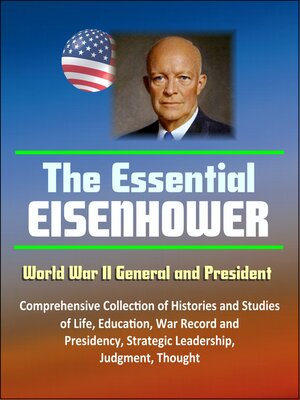The Essential Eisenhower
ebook ∣ World War II General and President--Comprehensive Collection of Histories and Studies of Life, Education, War Record, and Presidency, Strategic Leadership, Judgment, Thought
By Progressive Management

Sign up to save your library
With an OverDrive account, you can save your favorite libraries for at-a-glance information about availability. Find out more about OverDrive accounts.
Find this title in Libby, the library reading app by OverDrive.



Search for a digital library with this title
Title found at these libraries:
| Library Name | Distance |
|---|---|
| Loading... |
This is a comprehensive and massive compilation of reports, documents, and academic research papers about the life and career of Dwight Eisenhower, the 34th President of the United States and commanding general of the Allied forces in World War II.
These documents are professionally converted for accurate flowing-text e-book format reproduction.
Contents include: Dwight D. Eisenhower and the Command and General Staff School: Watershed at Leavenworth * Eisenhower: The Centennial * Eisenhower Centennial Bibliography * Eisenhower Doctrine, January 5, 1957 * Farewell Radio and Television Address to the American People * World War II: Eisenhower and Clausewitz on the Western Front * The Relationship Between Fox Conner and Dwight Eisenhower * Grant and Eisenhower: A Comparative Study of the Soldier Turned Political Leader * The Leadership Development of Dwight D. Eisenhower and George S. Patton Jr. * Eisenhower and Suez: An Appraisal of Presidential Leadership * The Most Reasonable of Unreasonable Men: Eisenhower as Strategic General * Eisenhower as Strategist: The Coherent Use of Military Power in War and Peace * The Colonels' Revolt: Eisenhower, The Army, and the Politics of National Security * Eisenhower: Decision-making and Consensus in an Unfamiliar Context * The Eisenhower Model of Shared War Powers * Eisenhower, Strategic Operator and Leader * Cultivating Strategic Thinking: The Eisenhower Model * Can Judgment Be Developed: A Case Study of Three Proven Leaders (Patton, Eisenhower, Bradley) * A Comparative Analysis of the Military Leadership Styles of George C. Marshall and Dwight D. Eisenhower
Eisenhower's role in World War II was truly unique. Never before had a military commander been asked to accomplish a task of such magnitude as the conquest of Western Europe with such disparate forces and with such little real authority. What is more, Eisenhower's prescribed endstate was not a negotiated peace, but the enemy's "unconditional surrender"—a term that served great rhetorical purposes, but was never defined in either military or political terms. No one prior to World War II had ever held joint command of ground, air, and naval forces. No American had ever directed the combined forces of allied nations. Contemporary coalition commands that were formed in the Pacific, Middle East, and Southwest Asia were much less complex. They were generally focused exclusively on either land or sea operations, and all were much smaller. Eisenhower's massive unified command of joint and multinational forces was unparalleled in the war by either the Allies or the Axis. It is highly doubtful that anyone other than Eisenhower could have achieved victory on the terms he did, sustaining Allied unity and resolve through four bitter campaigns, and building a level of cooperation and trust with the Soviets that allowed him to compel a simultaneous German surrender on both fronts. What is more, Eisenhower did what General George C. Marshall and Field Marshal Sir Alan Brooke, the principal candidates for his ultimate command, could not or would not have done— establish himself as a true field commander who maintained real operational control of land and air combat forces at his headquarters.







